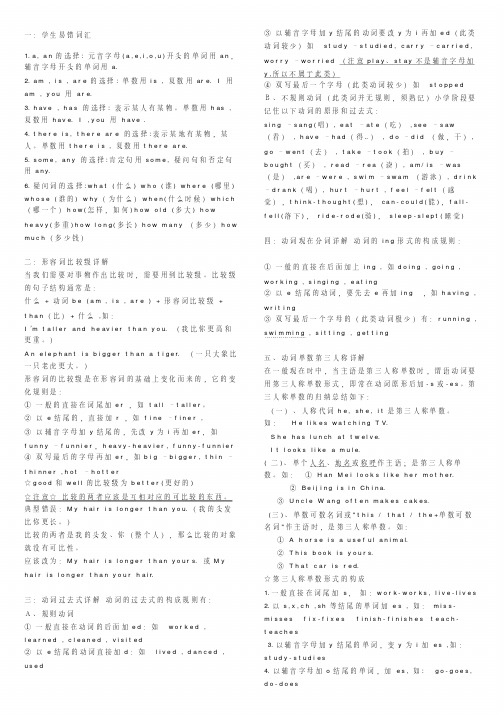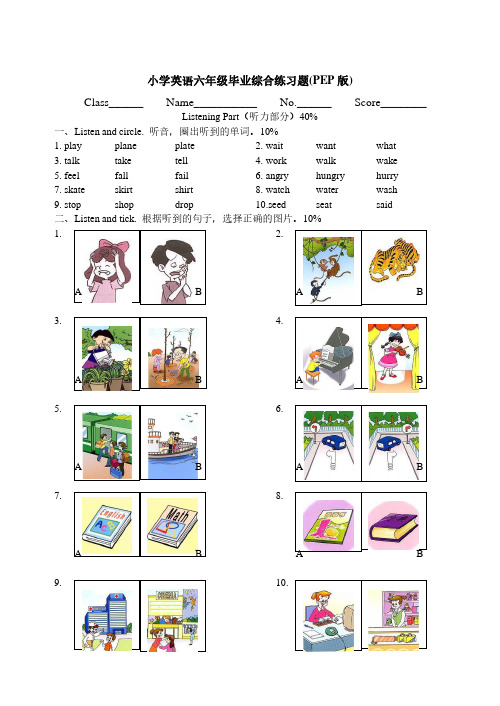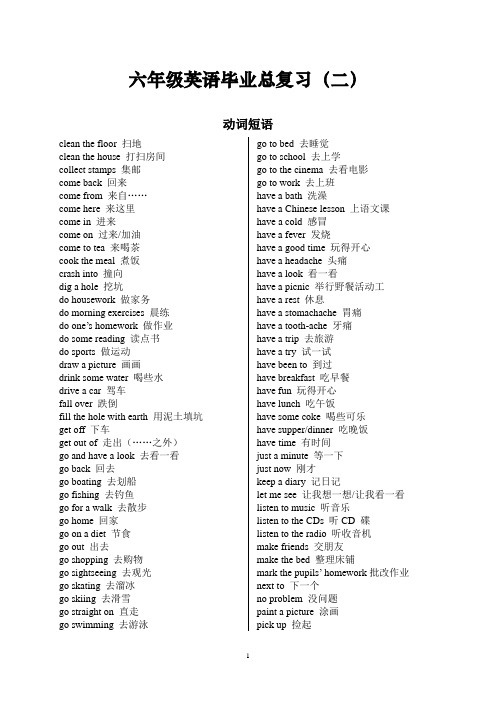小学六年级毕业考试-英语-复习资料汇总
- 格式:doc
- 大小:316.00 KB
- 文档页数:13

一:学生易错词汇1.a,a n的选择:元音字母(a,e,i,o,u)开头的单词用a n,辅音字母开头的单词用 a.2.a m,i s,a r e的选择:单数用i s,复数用ar e.I用a m,y o u用a r e.3.h a v e,h a s的选择:表示某人有某物。
单数用h as,复数用h a v e.I,y ou用h a v e .4.t h e r e i s,t h e r e a r e的选择:表示某地有某物,某人。
单数用t h e r e i s,复数用t h e r e a r e.5.s o m e,a n y的选择:肯定句用s o m e,疑问句和否定句用a n y.6.疑问词的选择:w h a t(什么)w h o(谁)w h e r e(哪里) w h o s e(谁的)w h y(为什么)w h e n(什么时候)w h i c h (哪一个)h o w(怎样,如何)h o w o l d(多大)h o wh e a v y(多重)h o w l o n g(多长)h o w m a n y(多少)h o w m u c h(多少钱)二:形容词比较级详解当我们需要对事物作出比较时,需要用到比较级。
比较级的句子结构通常是:什么+动词b e(a m,i s,a r e)+形容词比较级+t h a n(比)+什么,如:I’m t a l l e r a n d h e av i e r t h a n y o u.(我比你更高和更重。
)A n e l e p h an t i s b i g g e r t h a n a t i g e r.(一只大象比一只老虎更大。
)形容词的比较级是在形容词的基础上变化而来的,它的变化规则是:①一般的直接在词尾加e r,如t a l l–t a l l e r。
②以e结尾的,直接加r,如f i n e–f i n e r,③以辅音字母加y结尾的,先改y为i再加e r,如f u n n y–f u n n i e r,h e a v y-h e a v i e r,f u n n y-f u n n i e r④双写最后的字母再加e r,如b i g–b i g g e r,t h i n–t h i n n e r,h o t–h o t t e r☆g o o d和w e l l的比较级为b e t t e r(更好的)☆注意☆比较的两者应该是互相对应的可比较的东西。

六年级英语毕业总复习代词(一)人称代词一、概念人称代词是表示我、你、他/她/它、我们、你们和(他/她/它)们的词。
人称代词1.一般情况下,人称代词的主格作主语,放在句子的开头。
I am a teacher. 我是一名教师。
(I是主语)You are 11 years old. 你11岁了。
(You 是主语)He is my friend. 他是我的朋友。
(He是主语)It is hot today. 今天天气热。
(It是主语)2.宾格作宾语,通常放在动词,如:let, like, help,give,ask等的后面;或介词,如:for, to, of,at等的后面。
Can you help me?你能帮我吗?(me是宾语)The cake is for you. 这个蛋糕是给你的。
(you是宾语)3.作表语(用主格,口语中常用宾格)Who is that?It's me(I). 是谁啊?是我。
三、注意1.人称代词I无论放在句首、句中或句尾,都要大写。
2.人称代词she除了指女性“她”之外,还可以指祖国、月亮等拟人的东西。
如:I love my country. She is great.The moon is in the sky. She is round and bright.四、It的特殊用法1.一般情况下,it表示人以外的动物和东西,是单数名词的代词,译为“它”。
Where is your car?It is over there. 你的小汽车在哪儿?(它)在那边。
2.但在表示天气、时间、距离等时,用it来代替,此时的it,并不译为“它”。
1)指天气:It is sunny today. 今天阳光灿烂。
2)指气候:It's cold in this room. 这个房间很冷。
3)指时间:What time is it?It's six thirty. 几点了?六点半了。

小学英语六年级毕业综合练习题(PEP版)Class______ Name___________ No.______ Score________Listening Part(听力部分)40%一、Listen and circle. 听音,圈出听到的单词。
10%1. play plane plate2. wait want what3. talk take tell4. work walk wake5. feel fall fail6. angry hungry hurry7. skate skirt shirt 8. watch water wash9. stop shop drop 10.seed seat said二、Listen and tick. 根据听到的句子,选择正确的图片。
10%1. 2.A B A B3. 4.A B A B5. 6.A B A B7. 8.A B A B9. 10.A B A B三、Listen and choose. 听问句,选择正确的答句。
10%( )1. A. I’m 40kg. B. I’m 154cm. C. I’m 12.( )2. A. She’s fine. B. He has a cold. C. He feels happy. ( )3. A. ct. 1st . B. June 1st. C. Jan. 1st.( )4. A. I’m going to Hong ong. B. I’m going there by plane.C. I’m going to buy a book.( )5. A. She likes watching TV. B. She watches TV every evening.C. She is a TV reporter.四、Listen and match. 听短文,连线。
10%ei ei Y unnanLiu i NingboLi Ping Hangzhouheng Jing Harbinu Yifan Shanghairiting Part(笔试部分)60%五、riting(正确抄写句子,并圈出其中的元音字母)5%LET US G SA TING六、Read and arrange.将下列人名按照英汉字典中的先后顺序标号。

六年级英语毕业总复习(二)动词短语clean the floor 扫地clean the house 打扫房间collect stamps 集邮come back 回来come from 来自……come here 来这里come in 进来come on 过来/加油come to tea 来喝茶cook the meal 煮饭crash into 撞向dig a hole 挖坑do housework 做家务do morning exercises 晨练do one’s homework 做作业do some reading 读点书do sports 做运动draw a picture 画画drink some water 喝些水drive a car 驾车fall over 跌倒fill the hole with earth 用泥土填坑get off 下车get out of 走出(……之外)go and have a look 去看一看go back 回去go boating 去划船go fishing 去钓鱼go for a walk 去散步go home 回家go on a diet 节食go out 出去go shopping 去购物go sightseeing 去观光go skating 去溜冰go skiing 去滑雪go straight on 直走go swimming 去游泳go to bed 去睡觉go to school 去上学go to the cinema 去看电影go to work 去上班have a bath 洗澡have a Chinese lesson 上语文课have a cold 感冒have a fever 发烧have a good time 玩得开心have a headache 头痛have a look 看一看have a picnic 举行野餐活动工have a rest 休息have a stomachache 胃痛have a tooth-ache 牙痛have a trip 去旅游have a try 试一试have been to 到过have breakfast 吃早餐have fun 玩得开心have lunch 吃午饭have some coke 喝些可乐have supper/dinner 吃晚饭have time 有时间just a minute 等一下just now 刚才keep a diary 记日记let me see 让我想一想/让我看一看listen to music 听音乐listen to the CDs 听CD 碟listen to the radio 听收音机make friends 交朋友make the bed 整理床铺mark the pupils’ homework批改作业next to 下一个no problem 没问题paint a picture 涂画pick up 捡起plant trees 种树play badminton 打羽毛球play basketball 打篮球play cards 打牌play football 踢足球play games 玩游戏play table tennis 打乒乓球play tennis 打网球play the guitar 弹吉他play the piano 弹钢琴put away 放好put on 穿上put the tree into the hole 把树放进洞里ride a bike 骑自行车see a film 看电影surf the Net 上网take a message 传递信息take exercise 进行锻炼take medicine 服药take off 脱下take photos 照相turn off 关闭turn on 打开wait a moment 稍等一下wait for 等候wash clothes 洗衣服wash dishes 洗碟子watch a football match 看足球赛watch TV 看电视water the flower 浇花water the tree 浇树write a letter 写信介词短语a glass of 一杯……a lot of 许多……a map of 一幅……的地图a pair of 一双……a picture of 一幅……的画a plate of 一碟……agree with 同意……all of them 他们大家all of us 我们大家at first 首先at home 在家at last 最后at night 在晚上at school 在学校at the top of 在……顶部at the weeken 在周末be good at 擅长于……be made of 由……制造by the road 在路边by the way 顺便问问close to 靠近……different from 不同于fall down 跌倒far away from 远离from then on 从那时起from…to…从……到……full of 充满get off 下车get on 上车get out of 走出……之外get to 到达go on 继续hand in 上交help…with…帮助某人做某事in English 用英语in front of 在……前面in the afternoon 在下午in the east / south / west /north在东/南/西/北方in the evening 在晚上in the middle 在中间in the morning 在早上in the sky 在空中in time 及时in trouble 遇到麻烦It’s time to 是该……的时候了。

2017-2018学年闽教版英语六年级英语科考试范围及内容(一)字母与语音1.熟练掌握26个字母的大小写及顺序。
要求:会认,会读,会写.2.熟练掌握元音字母在开音节、闭音节的读音。
(以下单词中符合此规律的单词是四会词。
)26个英文字母手写体其中5个元音字母:Aa,Ee,Ii,Oo,Uu,剩下的21个都为辅音字母。
(二)单词1.数字one [wʌn] 1 eleven [i'levn]11 twenty-one ['twenti,wʌn]21two [tu:] 2 twelve [twelv]12 twenty-two ['twenti'tu:]22 three [θri:] 3 thirteen ['θə:ti:n]13 thirty ['θə:ti]30four [fɔ:] 4 fourteen ['fɔ:'ti:n]14 forty ['fɔ:ti]40five [faiv] 5 fifteen ['fif'ti:n]15 fifty ['fifti]50six [siks] 6 sixteen ['siks'ti:n]16 sixty ['siksti]60seven ['sevn] 7 seventeen ['sevn'ti:n] 17 seventy['sevnti] 70eight [eit]8 eighteen ['ei'ti:n]18 eighty ['eiti]80nine [nain]9 nineteen ['nain'ti:n] 19 ninety ['nainti]90ten [ten]10 twenty ['twenti]20 hundred ['hʌndrəd]百2. 动物:animaldog [dɔg] 狗cat [kæt] 猫bird [bə:d] 鸟duck [dʌk] 鸭子pig [pig] 猪cow [kau]奶牛fish [fiʃ] 鱼tiger ['taigə] 老虎panda ['pændə] 熊猫horse [hɔ:s] 马hen [hen] 母鸡frog [frɔg] 青蛙lion ['laiən] 狮子rabbit ['ræbit] 兔子sheep [ʃi:p] 绵羊增选:elephant ['elifənt] 大象monkey ['mʌŋki]猴子rooster ['ru:stə] 公鸡fox [fɔks] 狐狸wolf [wulf] 狼snake[sneik] 蛇mouse[maus] 鼠1.I like cats. 我喜欢猫。

There be 句型与have,has的区别一、There be句型1.表示:在某地有某物或某人.2.在there be 句型中,主语是单数或不可数名词,be 动词用is ;主语是复数,be 动词用are ;如有几件物品,be 动词根据最近be动词的那个名词决定.There is a book on the desk。
There is some water in the glass.There are three men under the tree 。
There is a bag,two books and three pens on the desk。
3.there be句型的否定句在be 动词后加not ,一般疑问句把be动词调到句首。
There is a duck in the river.否定句:There is not a duck in the river。
一般疑问句:Is there a duck in the river?4.some 和any 在there be 句型中的运用:some 用于肯定句, any用于否定句或疑问句。
5.and 和or 在there be句型中的运用:and用于肯定句,or用于否定句或疑问句。
6.针对数量提问的特殊疑问句的基本结构是:How many + 名词复数 + are there + 介词短语?How much + 不可数名词 + is there + 介词短语?7.针对主语提问的特殊疑问句的基本结构是:What’s + 介词短语?二、have,has1.表示:某人或某物“拥有”什么东西,强调“所属关系",而且某人某物作为句子的主语。
2.have用在人称I,we,you,they和复数的人或物后面。
has用在人称he, she,it和单数和人或物后面。
I have a daughter. He has a lucky dog.三、There be句型与have,has有时也可以通用.如:The classroom has ten desks。
六年级期末复习(根据首字母填空:句子)班级______姓名_____学号______1.He n_____goes to bed late.2.I’m l_____for school today.3.Her room is clean and t_____.4.She is a good girl.She has many good h_____.5.Can you f_____your work on time?6.He can run f_____.7.The c_____are playing in the park.8.Please k_____your desk clean.9.He watched TV late last n_____.10.The girl goes to school e_____.11.I have a h_____diet.12.He onoy drinks a l_____water every day.13.We have a f_____eggs every week.14.I want to eat some f_____.15.You shouldn’t d_____too much cola.16.The bag is too h_____.k is good f_____your body.18.He has a l_____of rice for lunch.19.My mother is a writer.She is good at w_____.20.My uncle is a d_____.He always helps sick people.21.Let’s take c_____of our teeth.22.I want to be a policeman in the f_____.23.Do you f_____sleepy?24.We n_____water every day.25.There’s a bag of r_____over there.26.You m_____do your homework first.27.Each student should f_____the classroom rules.28.My father is a t_____.He often h_____his students.29.We are going to h_____a party this evening.30.Let’s b_____our party. OK.31.The girl p_____the piano yesterday evening.32.Australia is an interesting c_____.33.What’s she doing? She’s c_____ nice food.34.W_____to my farm.Thank you.35.Many v_____come to China every year.36.You can find some i________ places in the UK.37.I w_____go to Nanjing next week.38.What’s your father doing now?He’s reading n________.39.They want to f_____out about this city.40.The football game is very e________.41.What do you t_____?42.What’s your d_____?43.I want to f_____a spaceship to the Moon.44.I like dancing. I want to be a d_____.45.It will c_____true some day.46.A policeman s_____be brave and strong.47.Just then,the mouse s_____the lion behind him.48.Yang Ling sits under the tree q_____.49.The lion let the mouse g_____.50.Can you h_____me?51.The next day,two men c_____the lion.52.The students laugh l_____.53.The two boys b_____good friends at last.54.I can’t r_____the ball on the desk.It’s too high for me.55.They win the game.They are very e_____.56.He h_____an idea at last.57.He h_____the ball hard just now.58.There is not m_____juice in the fridge.59.There are many busy r_____in the city.60.You must walk on a zebra c_____.61.You must wait for the green m_____.62.You can wait on the p________.63.We must look at the t_____lights.64. He b_____ __ his t_____ __ in the morning and before bedtime.65. At home, Wang Bing a_____ __ puts his things in o_____.66. He sometimes f_____ s_____in the morning.67. Mike d_____ a lot of milk for b_____.68. D_____mike have a healthy diet?69. For l_____ and d_____ , Yang Ling eats some vegetables and some meat.70. I’m h_____, Mum.71. How can you c_____ the road s_____?72. Hi, Su Hai. This is Lucy. She’s a n_____student. Can you s_____ her around our school?73. You can wait on the p________.74. But it’s too deep. I can’t r_____ it.75. Liu Tao feels _____(sleep)in the morning.76. Look at those p_____ of our Earth.77. We use wood to m_____beds.78. Nancy g_____a red packet last Spring Festival.79. A: Where will you go for the summer holiday?B: I will go to Beijing by p_____.80. A: Will he s_____ in London for a month?B: Yes, he will.81. Miss Li is a_______ the s_____ about their dreams.82. D_____makes people h_____ and beautiful.83. Mike wants to be a dentist to t_____care of children’s t_____.84. Sam will do m_____sport to make him s______.85. I always have breakfast o___ time.86. He has many good h_____.87. My brother is going to buy some v________.88. A_______is a beautiful country in the world.89. What is your p_____for summer holiday.91. Be c_______!The floor is wet. Thank you.92 Don’t use too much p_____. It’s had for the earth.93.Today is June 1st . It’s C_________Day.94. May I ask you some q_________?95. We s_______talk in class.96. The sign on the wall m_____“keep quiet”.97. S_______ is the first day of a week.98. L ook! They’re t_______a walk.99. Yesterday my family a_____much nice food at home.100. The running race is very e_______.。
新PEP小学英语六年级总复习资料小学英语教材所选内容均来源于学生学习及日常生活,为学生所熟悉的。
因此,教师得抓住时机,充分运用教材,从起始年级,培养学生良好的说话的习惯。
小编在这里整理了英语相关知识,快乐看看吧!新PEP小学英语六年级总复习资料一. 反义词big(大的)--- small(小的) black(黑色)---white(白色) free(闲的)---busy(忙的)hot(热)---cold(冷) same(相同的)祝福您及家人身体健康、万事如意、阖家欢乐!祝福同学们快乐成长,能够取得好成绩,为祖国奉献力量!祝福您及家人身体健康、万事如意、阖家欢乐!祝福同学们快乐成长,能够取得好成绩,为祖国奉献力量!---different(不同的) cool(凉爽)---warm(暖和)tall(高的)---short(矮的) long(长的)---short(短的) young(年轻的)---old(老的)here(这里)---there(那里) before(之前)---after(之后) new(新的)---old(旧的)二. 单词归类1.国家(country)China中国 America美国 Australia澳大利亚 Japan日本England英国 Canada加拿大 France法国2.国籍(nationality)Chinese中国人American美国人Australian澳大利亚人Japanese日本人English英国人 Canadian加拿大 French 法国人3.语言(language)Chinese汉语 Japanese日语 English英语 French 法语4.科目(subject)Chinese语文 maths 数学 English 英语 art 美术music音乐 P.E. 体育 computer 电脑 science科学5.星期(week)Sunday星期日 Monday星期一 Tuesday星期二 Wednesday星期三Thursday星期四 Friday星期五 Saturday星期六6.季节(season) spring 春天 summer夏天 autumn秋天 winter 冬天7.月份(month)January一月 February 二 March三月 April四月 May五月 June 六月July 七月August 八月September 九月October 十月November十一月 December十二月8.节日(festival)Spring Festival 春节 Dragon Boat Festival龙舟节 Mid-autumn Festival中秋节New Year’s Day元旦National Day 国庆节Children’s Day儿童节Easter复活节 Halloween万圣节 Christmas 圣诞节Women‘s Day妇女节Teacher’s Day 教师节May Day劳动节9.患病(illness): have a fever发烧hurt疼痛have a cold感冒have a toothache牙疼have a headache头疼have a sore throat喉咙疼10.食物(foods)cake蛋糕 mooncake月饼 dumpling 饺子 bread 面包 pork猪肉fish鱼肉chicken 鸡肉meat肉beef 牛肉egg鸡蛋rice米饭soup汤 salad 沙拉 sandwich三文治 pizza 比萨饼 hamburger 汉堡包 noodles 面条11.时间(time)year年month 月week周date日期day 白天hour 小时morning早上afternoon下午evening晚上yesterday昨天today今天tomorrow明天 next week下个周 last weekend上个周末 last year 去年 the day before yesterday前天 two months ago12.服装(clothes)T-shirt T恤衫 sweater毛衣 coat 大衣 shorts短裤 jeans牛仔裤hat帽子cap帽子 shoe鞋子 sock 短袜 glove 手套scarf 围巾dress连衣裙skirt短裙shirt衬衫13.动物(animals)chicken鸡 duck鸭 goose鹅 dog狗 cat 猫 pig猪 sheep绵羊goat 山羊horse马lion狮子tiger老虎elephant 大象snake蛇kangaroo 袋鼠 monkey 猴子bear 熊 panda熊猫 whale鲸 hen母鸡 mouse老鼠 giraffe长颈鹿 deer鹿14.颜色(colour)grey 灰色 red红色 green绿色 yellow黄色 blue蓝色 white白色 black黑色pink粉红色 orange橙色 brown褐色 purple紫色15.饮料(drinks):juice汁 milk 牛奶 Coke可乐 tea茶 coffee 咖啡 water 水16.数字基数词:one 一 two 二 three三 four四 five五 six 六 seven七eight八 nine 九 ten十 eleven 十一 twelve 十二 thirteen 十三 fifteen 十五 twenty二十thirty 三十 forty 四十 fifty五十 hundred 百 thousand 千 million 百万序数词:first 第一 second第二 third第三 fifth第五 sixth第六seventh第七eighth第八ninth第九twelfth 第十二twentieth 第二十thirtieth第三十17.植物、水果蔬菜tree 树 flower花 grass草 fruit 水果 apple苹果 pear 梨 orange 橙 banana 香蕉 grape葡萄 peach桃子 strawberry草莓watermelon 西瓜pineapple菠萝vegetable蔬菜tomato西红柿potato马铃薯onion洋葱 cabbage卷心菜 green beans豆角18.职业(jobs)worker工人 farmer农民 doctor医生 nurse护士 teacher 教师driver司机 cook厨师 police officer警察 singer歌唱家cleaner清洁工postman邮递员fisherman 渔夫pilot飞行员coach教练businessman商人19、自然界sun太阳 moon月亮 star星星 sky天空 river江河 lake 湖 sea大海 hill山mountain山脉 snow雪 wind风 cloud云 rain雨20、天气(weather)sunny阳光明媚的windy有风的cloudy多云的snowy下雪的rainy下雨的 dry干燥的wet湿的 warm暖的 cool凉爽的 cold冷的 hot热的21、人体部分head头 hair头发 hand手 face脸 eye眼 ear耳朵 nose鼻子 leg 腿 foot脚22、人people人们 man男人 woman妇女 child小孩 grandparents祖父母 parents父母 father父亲 mother母亲 sister姐妹 brother兄弟cousin堂兄 uncle舅舅、叔叔 aunt阿姨23、文具pen钢笔 pencil铅笔 rubber橡皮 ruler尺 knife小刀 map地图dictionary字典24、建筑与房屋部分bedroom卧室living-room客厅kitchen厨房study书房washroom 卫生间 garden花园 office办公室 bank银行 school学校hospital医院cinema电影院park公园zoo动物园shop商店bookstore书店supermarket超市library图书馆museum博物馆post office邮局TV station电视台hotel宾馆wall墙floor 地板window 窗 door门25.日用品lamp台灯 light灯 telephone电话 clock钟 fridge冰箱 cup杯glass玻璃杯 box盒子 bowl碗26.方位词left左 right右 in front of 在前面 behind后面 near附近 next to与相邻27.家具bed床 desk书桌 table桌子 chair椅子 shelf 书架sofa沙发28.餐食meal一顿饭 breakfast早餐 lunch 午餐 dinner晚餐29.交通工具bus公共汽车 train火车 car小汽车 bike自行 ship轮船 boat小船 plane飞机 ferry轮渡 subway地铁 taxi出租车30.外貌tall高的 short矮的 fat胖的 thin 瘦的healthy健康的 nice好看的 beautiful(pretty)美丽的strong强壮的 old 老的 young 年轻的 heavy重的31.性格clever(smart)聪明的active活跃的quiet安静的shy 害羞的hard-working勤奋的strict严厉的kind和蔼的polile 有礼貌的helpful乐于助人的能干的四.动词词组go shopping去购物 go fishing去钓鱼 go boating去划船 go swimming 去游泳go skiing 去滑雪 go skating去溜冰 go for a walk 去散步 go hiking去远足 go on a picnic去野餐 go camping去野营 go to the cinema 去看电影 go to bed去睡觉 go to school去上学 go to work 去上班 go back回来 go out出去play football 踢足球play basketball打篮球play table tennis(play ping-pong)打乒乓球play badminton 打羽毛球 play the piano 弹钢琴 play games 玩游戏 write a letter写信listen to music听音乐 watch TV 看电视 see a film 看电影 take photos(pictures)照相clean the room打扫房间 wash clothes洗衣服 draw a picture 画画 have breakfast 吃早餐 have lunch 吃午餐 have dinner 吃晚饭do housework 做家务do my homework做作业have a Chinese lesson 上语文课take a dancing class上舞蹈课do morning exercises晨练pick apples 摘苹果plant trees种树wait for等候make cakes 做蛋糕 make the bed 铺床make a card 做卡片look for 寻找 put on穿上 wake up醒来 get up 起床五. 介词短语a pair of 一双 a lot of 许多 on the farm在农场 in front of在…前面 in the sky 在空中 on foot步行 in the morning 在早上in the afternoon在下午 in the evening在晚上 at night在晚上 at school 在学校 at home在家六、易错词汇1. a, an的选择: 元音字母开头的单词用an,辅音字母开头的单词用a.2. am , is , are的选择: I 用 am , you 用 are. 第三人称单数用is , 复数都用are.3. have , has 的选择: 表示某人有某物。
小学六年级英语总复习资料Class Name Number一、词汇归类1.数词number2.代词be动词is, am, are的选择: 单数时用is,复数时用are, I 用am, you 用are3.介词in +较长的段的时间in a year/spring/month/September/week;in the morning/afternoon/eveningon+具体的某一天On Sunday/Monday/Tuesday/Wednesday/Thursday/Friday;on June 30that+时间点/在…岁时/在….的期间at 11:00;at the age of 12;at noon; at night;at the beginning of…方位介词(on、in、at、under、bebind、above、over、in front of):表示事物存在的方向和位置4.特殊疑问词5.同音词I—eye, for—four, where—wear, pear—pair, see—sea, right-- write board—bored, sun—son, hour—our, one—won, here—hear, deer—dear, no—know, there—their, to-- too—two, by-- bye—buy6.缩写形式与完整形式isn’t=is not aren’t=are not I’m=I am it’s=it is can’t=can not could not=couldn’t she’s=she is he’s=he is you’re=you are we’re=we are don’t=do not doesn’t=does not they’re=they are what’s=what is who’s=who is that’s =that is did not=didn’t let’s=let us 二、Let’s spell三、语法点归类1.名词的运用单数名词:一般情况下用a可数名词以元音开头的单词用an (元音字母有:a e i o u)(如:an umbrella/ apple/egg/e-mail/ice cream/orange/umbrella/ elephant)复数名词:一般在词尾加s不可数名词如meat/milk/juice/water/tea/coffee/ soup2.名词单数变复数的规则3.形容词的比较级①形容词比较级的运用:将两个事物或人进行比较要用比较级,句型结构:4.四种时态(一般现在时、现在进行时、一般过去时、一般将来时)⑴一般现在时①用法:表示经常反复发生的动作、存在的状态或习惯性的动作的时态。
小学英语毕业考试总复习资料小学六年级英语总复习一、26个字母:元音字母:Aa,Ee,Ii,oo,Uu二、语音知识:Aanae名字cae蛋糕gate大门cage鸟笼snae蛇face 脸baby娃娃apple苹果cat猫bag书包hat帽子fat胖的Eethese这些three三sheep绵羊nee膝盖tree树beans 豆角egg蛋elephant大象des课桌bed床pen钢笔leg腿Iifive五nine九lie喜欢ite风筝bie自行车fish鱼big大的six小的il牛奶is是it它this这个oonose鼻子those那些bone骨头toe脚趾头goat山羊boat船coat大衣dog狗fox狐狸frog青蛙box盒子hot热的not不是Uuyou你,你们use使用puter计算机blue蓝色的flute笛子june六月bus公共汽车ubrella雨伞uncle叔叔cccD光盘circle圆形cent分钱cat猫caera照相机Ggorange桔子giraffe长颈鹿page页frog青蛙girl女孩big大的gate大门ththin瘦的three三thirteen十三outh嘴other妈妈father爸爸brother兄弟they他们this这个that那个feather羽毛hhat什么hen什么时候here哪里hy为什么hich哪一个hite白色的ater水oan女人al走ho谁hose谁的arcar汽车par公园far农场ar手臂star星星irgirl女孩bird鸟nurse护士purse钱包turtle海龟third第三hurt疼oco奶牛ol猫头鹰house房子ouse鼠,鼠标cloudy多云的ooiboy男孩toy玩具oyster贝壳oil油coin硬币boil 沸腾oroorhorse马store商店corn玉米door门floor地板airearchair椅子hair头发pear梨bear熊ooboo书good好的loo看foot脚oon月亮food食物pool池子roo房间字母s或es的发音:字母s在词首发音为/s/,在中间如:usually,television,treasure,casual中发音为//;以/p/,/t/,//清音收尾,读音为/s/;其他情况一般读音为/z/;以s,x,ch,sh收尾加es的,es读音为/iz/。
小升初小学六年级毕业考试英语复习资料汇总一学生易错词汇1、a, an的选择: 元音字母开头的单词用an,辅音字母开头的单词用a.2、am , is , are的选择: 单数用is , 复数用are. I 用 am , you 用 are.3、have , has 的选择: 表示某人有某物.单数用has , 复数用have. I ,you 用 have .4、 there is, there are 的选择:表示某地有某物,某人.单数用there is , 复数用there are.5、some, any 的选择: 肯定句用some, 疑问句和否定句用any.6、疑问词的选择:what (什么) who (谁) where (哪里) whose (谁的) why(为什么)when(什么时候)which(哪一个)how old (多大) how many (多少)how much(多少钱)二形容词比较级详解1.当我们需要对事物作出比较时,需要用到比较级。
比较级的句子结构通常是:什么+动词be(am,is,are)+形容词比较级+than(比)+什么,如:I'm taller and heavier than you. (我比你更高和更重)An elephant is bigger than a tiger. (一只大象比一只老虎更大)2.形容词的比较级是在形容词的基础上变化而来的,它的变化规则是:①一般的直接在词尾加er,如tall-taller,strong-stronger,②以e结尾的,直接加r,如fine-finer,③以辅音字母加y结尾的,先改y为i再加er,如funny-funnier④双写最后的字母再加er,如big-bigger,thin-thinner,hot-hotter☆注意☆比较的两者应该是互相对应的可比较的东西典型错误:My hair is longer than you. (我的头发比你更长)应该改为:练习:将单词heavy tall long big 改成适当的形式将句子填完整。
(1)How------------------------- is the Yellow River?(2)How-------------------------is Mr Green . He’s 175 cm.(3)How-------------------------are your feet? I wear size 18.(4)How-------------------------is the fish ? It's 2 kg.三动词过去式详解动词的过去式的构成规则有:A,规则动词①一般直接在动词的后面加ed:如 worked , learned , cleaned , visited②以e结尾的动词直接加d:如 lived , danced , used③以辅音字母加y结尾的动词要改y为i再加ed(此类动词较少)如study – studied carry – carried worry – worried(注意play,stay不是辅音字母加y,所以不属于此类)④双写最后一个字母(此类动词较少)如 stoppedB,不规则动词(此类词并无规则,须熟记) 小学阶段要记住以下动词的原形和过去式:sing - ______ eat - ______ see - ______ have - ______ do - ______go - ______take -______buy - ______get - ______read - ______fly - ______am/is - ______are - ______say - ______leave - ______swim - ______tell - ______draw - ______ come- ______ lose -______find - ______drink - ______hurt - ______feel - ______四动词现在分词详解动词的ing形式的构成规则:①一般的直接在后面加上ing , 如doing , going , working , singing , eating②以e 结尾的动词,要先去e再加ing ,如having , writing③双写最后一个字母的(此类动词极少) 牢记: running , swimming , sitting , getting五人称代词与物主代词一、人称代词六句型专项归类1、肯定句: 是指用肯定的语气来陈述的句子,如:我是个学生。
她是个医生。
他在医院工作。
教室里有四台风扇。
他将在中午十二点吃饭。
我昨天晚上看电视。
2、否定句: 含有否定词或表示否定意义词的句子。
☆小结☆否定句主要是在肯定句的基础上加上了否定词 "not".有动词be的句子则"not"加在be后面,可缩写成"isn't,aren't",但am not 一般都分开写。
没有动词be的句子则要先在主要动词的前面加上一个助动词(do,does,did),然后在它后面加上"not",也可以把它们缩写在一起如:"don't , doesn't , didn't ,这三个助动词要根据人称和时态来选择,其中"does"只用于一般现在时主语是第三人称单数的情况。
"did"只用于一般过去时,不论主语是什么人称和数,都用"did" .3、一般疑问句:是指询问事实的句子,此类句子必须用"yes",或"no"来回答.如:Are you a student?Is she a doctor?Does he work in a hospital?Are there four fans in our classroom?Are you going to buy a comic book tonight?Will he eat lunch at 12:00?Are they swimming?Did you watch TV yesterday evening?☆小结☆一般疑问句是在肯定句的基础上,①把动词be调到首位,其他照写,末尾标点符号变成问号即可②没有动词be的句子则要在句首加上一个助动词(do,does,did)再把紧跟在后面的动词变回原形,末尾标点符号变成问号即可.这三个助动词也要根据人称和时态来选择,其中"does"只用于一般现在时主语是第三人称单数的情况,而"did"只用于一般过去时,不论主语是什么人称和数,都用"did" .一般疑问句有个重要的原则就是问和答要一致,即问句里的第一个单词(助动词)和简略答句里的这个词是一致的.4、特殊疑问句:以特殊疑问词(what , where , who , which , when , whose , why , how)开头引导的句子.此类句子应该问什么就答什么,不能用"yes ,no"来回答.如:What is this?What does he do?Where are you going?Who played football with you yesterday afternoon?Which season do you like best?When do you usually get up?Whose skirt is this?Why do you like spring best?How are you?How did you go to Xinjiang?☆其中how又可以和其他一些形容词连用组成特殊疑问词组用来提问,如:how many 多少(数量;how much 多少(钱);how tall 多高;how long 多长;how big 多大;how heavy多重,如:How many pencils do you have?How many girls can you see?How many desks are there in your classroom?☆小结☆how many 用来提问可数名词的数量,主要有以上三种句式搭配,How many + 名词复数 + do you have 你有多少……How many + 名词复数 + can you see 你能看见多少……How many + 名词复数 + are there…有多少……七完全,缩略形式I'm=__________he's=__________she's=__________ they're=__________ you're=__________ there's=__________ they're=__________can't=__________don't=__________doesn't=__________isn't=__________aren't=__________let's=__________won't=__________I'll=__________wasn't=________☆小结☆通常情况下,'m即am, 's即is (但 let's=let us), 're即are ,n't即not (但can't=can not)八小学英语词汇归类表. .。